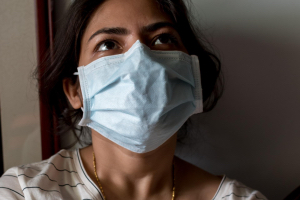
Focus
The mental torture of women is a new trend!
After the devastating second wave, our Sampurna executives studied the impact of Covid-19 on domestic violence to understand how a crisis situation impacts these sensitive cases. Two timelines were studied i.e. cases before and during Covid.
As per the findings, more women are survivors of mental violence in comparison to physical violence. It can be said that the tendency of a male to rely on his physical strength is shifting towards impacting the mind of women. The harassment could be done through gestures of shouting, anger and hurting her emotionally. This situation only got worse as many women reported that they received little to no help in doing the increased household chores during the lockdown. Increased workload and continuous control by the spouse made the situation unbearable. Women felt trapped. Though mental and physical violence were significantly higher, women also faced economic and sexual abuse. Emotional abuse, which is explicitly mentioned in the Protection of Women from Domestic Violence Act, 2005, was not distinctly recorded. However, one cannot separate emotional abuse when mental, physical, economic, verbal or sexual abuse occurs.
The family also plays a crucial role in cases of domestic violence. Family is key in shaping the personality of a person. Survivors and perpetrators – both are by-products of their family traits. The father, mother, brother, sister, partner and children are all in the closest circle of an individual. All of them influence the behaviour of that individual. In essence, if a woman chooses to stay despite the abuse, it could be for the sake of her parents, children or her dependency on her husband or in-laws. Similarly, the abuse can get worse if her in-laws do not admonish the behaviour of their son or vice-versa. In the cases observed in the study, a significant fact emerged. Survivors of domestic violence coming from a joint family are more than the nuclear family. It further reveals that the role of the immediate family including the in-laws is quite important in contributing to domestic violence.
When the age of the survivor was considered, it reflected that relatively young age is directly correlated to the incidence of violence at home. It could be attributed to a more energetic temperament of the survivor and the perpetrator given their age. Women at this age also have a higher drive to speak up for themselves. With age, the abuse becomes a thing of their daily lives and she stops bringing it up, getting busy caring for their children. She continues to take care of the husband, his family and the children.
Whether in a normal situation or a crisis situation, why are women subjected to violence?
For the last two decades, Sampurna Family Counseling Center (FCC) in Delhi has dealt with various cases pertaining to domestic violence. The majority of the clients are women who are illiterate, doing petty jobs to fetch their meal of the day. Family Counseling Centers were introduced by the Ministry of Women and Child Development, Government of India as a platform for NGOs to help the strained relationships in a family. Since 2005, domestic violence has been recognized as a criminal offence in India after the Protection of Women from Domestic Violence Act, 2005 was introduced into Indian Legislation. Even then, it took a long time for this law to become known in every Indian household. Efforts by both the Government and Voluntary Sector were necessary to curb this evil. As such, non-governmental agencies engaged in the field of women empowerment are doing their best to ensure that a woman knows her legal rights along with her right to be treated respectfully as a human being in her home.
Intimate partner violence or domestic violence is by far the most prevalent form of violence against women globally. Domestic Violence can be defined as an act intended to harm the well-being of a woman by a person in her domestic circle. She may experience it before and or after marriage in the form of physical, mental, emotional, financial or sexual abuse inflicted on her. In the Indian context, the victim of domestic violence is often a woman who marries into her husband’s family. She struggles to find a new home, form bonds with her new family and find happiness in her new life. Instead, she faces domestic violence. Rituals like giving dowry, alcohol and drug abuse, gender bias and the widening gap between the education and growth of women versus the growth of society’s mindset may be some of the causes behind domestic violence.
Domestic Violence is already a grave subject which needs to be dealt with sincerity. The authorities involved need to be sympathetic and thorough in their workings. Unfortunately, there are many obstacles in the path of justice for the aggrieved. The outbreak of Covid-19 worsened the situation. The world was going through a terrible time and women even more so. Lockdown – which was needed to bring the Covid situation in control – could pose a risk to victims of domestic violence, putting their lives in danger. Women found themselves in uncomfortable situations due to the continuous presence of their husbands at home.
Alas, women continued to be subjected to violence at home as a result of the aggressive behaviour displayed by the intimate partner and/or his family in the crisis situation. The FCC counsellors prepared to deal with the domestic violence cases – an ironic reality of the 21st century where women are breaking the gender barriers but are still being subjected to abuse in their own homes.
*Dr Shobha Vijender is the founder and president of Sampurna NGO established in 1993. Having done her Doctorate in Social Work, she believes that timely education and counselling are indispensable for a better marital life.


 By
By 



I am very grateful to you for the information. It very much was useful to me.